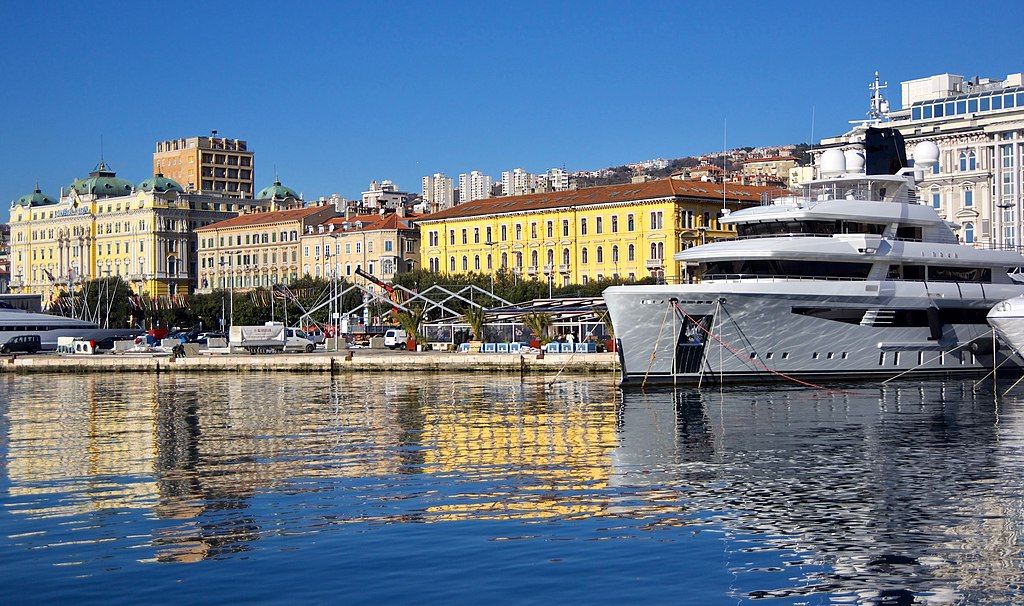February the 9th, 2024 – One of the most famous figures in Rijeka’s history is Caroline of Rijeka, a woman who single-handedly saved the city from British invasion during the Napoleonic wars.
As Nikolina Demark writes, ever been to Rijeka? If so, you must have taken a walk along the waterfront (or strolled even further to the lovely Molo Longo pier). You wouldn’t have been the only one to do so: locals love to meet on the waterfront on weekend mornings, grabbing a coffee to catch up with their friends and soaking up the sun when the weather gods take mercy on us and gift us with a day with no rain.
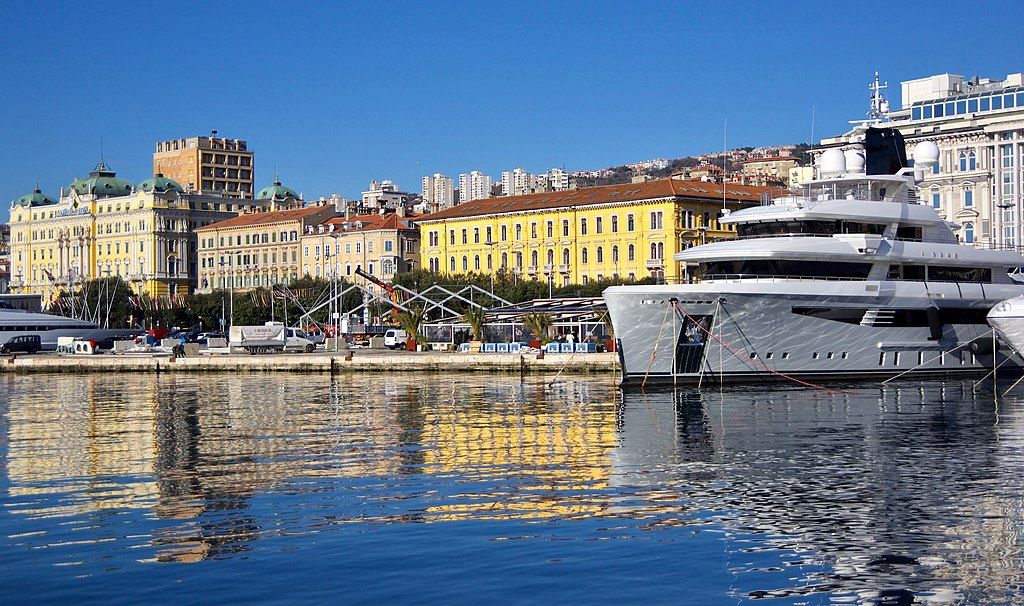
While this particular place is commonly referred to as riva, you might notice the pier’s official name is actually Karolina Riječka – Caroline of Rijeka. Who was this enigmatic lady, and what did she do to deserve her own urban hotspot by the sea? Glad you asked: she’s the one who saved the city from British invaders in the early 19th century. The story lies halfway between fact and legend, but man, is it a good story to tell. Let’s take a look at one of the most famous residents in Rijeka’s history:
Caroline of Rijeka was born as Karolina Kranjec in 1791. Her father, an experienced sea dog named Francesco Kranjec, made a fortune as a business-savvy merchant and climbed his way to the top of the social elite, becoming a respected citizen of Rijeka. Once a widower, he re-married to a young Viennese lady named Ana Marija Stolz. The couple had several daughters, one of them Caroline.
Caroline had quite a carefree childhood, having lived in an age of prosperity and cultural life blossoming in the city. She received a quality education and was taught impeccable manners, as was expected of all young women of her social rank. She was fluent in Italian and French, and was known to attend cultural events; for example, she was often seen at the Adamić theatre that opened in 1805. Caroline was also often described as a woman of exceptional beauty and an elegant taste in fashion; all things considered, she was what we would today describe as a catch. She married at the age of 17, to a merchant and shipowner Andrija Belinić from Rijeka.
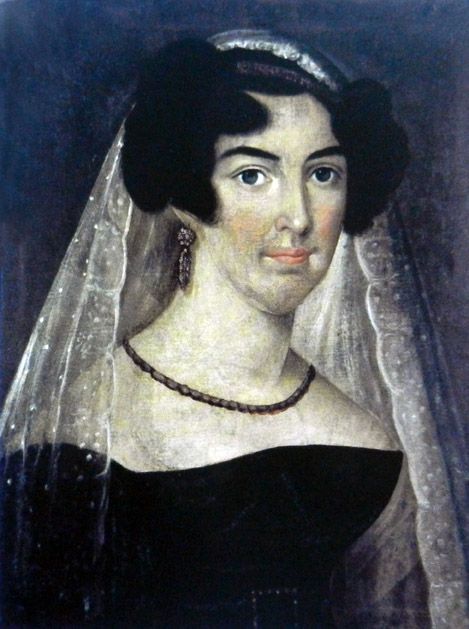
At the turn of the century, Rijeka was ruled by the French, having been conquered by Napoleon’s army in 1809. In 1813, amidst the Napoleonic Wars, the British fleet invaded the city, subjecting Rijeka’s coastline to merciless cannon fire.
On July 1, five English navy ships anchored some 5 miles off the coast of Rijeka. The locals, bless their naive souls, thought the sailors were there to stock up on fresh drinking water, curiously observing the strange fleet from a safe distance – until the newcomers unleashed the first artillery strike on the morning of July 3. At the time, the city had no proper defense; it was still some 150 years away from becoming a major Austro-Hungarian port of strategic importance. After this unexpected attack, 600 English soldiers disembarked on the shore, going on to pillage the city and set anchored sailing ships and warehouses on fire. The local population and the French army were quick to retreat, while the invaders continued to fire in the direction of the Old Town and Trsat, convinced the two locations were housing Napoleon’s troops.
Amidst the all-around frenzy and panic that was quick to spread, one young woman kept a clear mind and decided to do something to stop the vicious attacks. Caroline paid a visit to the English admiral Thomas Francis Freemantle who was in charge of the navy to make a case for her city and plead for a ceasefire.
Facts get a bit murky at this point of the story. We’re all prone to overplaying the drama and spinning theatrical stories about historical events, and Caroline’s feat inspired many a creative account, to say the least. For example, you’ll often hear she picked a low-cut black dress for this solemn visit to appeal to the admiral’s eye. Building on that, it has also been speculated she… hadn’t resorted to words alone to convince him to spare the city, to put it nicely. Let’s leave gossip aside and focus on the single important fact: her attempts were successful, delivering Rijeka from what could have been an absolute destruction.
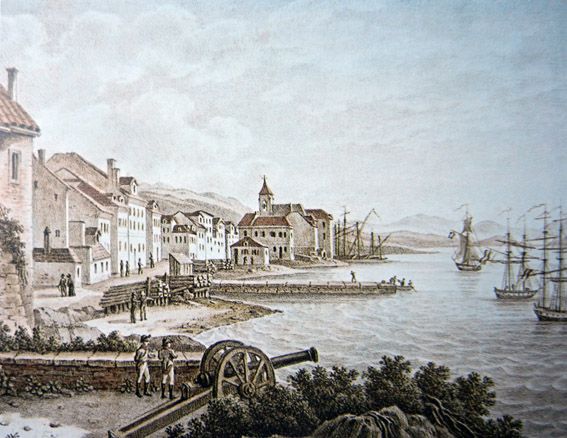
She reportedly addressed Freemantle in French, lamenting the unfortunate state of affairs and pleading the admiral to help her co-citizens in such a difficult time. Considering the French army had already left the city at that point, there was no sense to subject Rijeka to further devastation. The experienced soldier was supposedly impressed by her eloquent, reasoned presentation to such an extent, he promised he would put a stop to the offense and cease all raids on private property. Freemantle kept his word; many people had their ships spared as a result, other valuable property was spared from damage as well, and the city avoided major devastation. Three days later, the British fleet sailed out from Rijeka and unleashed cannon fire on its neighbour Bakar.
It has been said there’s something mythical to Caroline’s courageous act. Amidst the smoke and the scent of gunpowder lingering in the air, this young woman went straight to the navy commander, all alone, without a second thought. She was not a revolutionary – just a wealthy young citizen who was reputable enough to have been granted a meeting with the English admiral during an ongoing military operation. In the end, it was her composure, eloquence and charm that saved the city from a tragic fate.
In her own lifetime, Caroline didn’t receive proper commendation for her actions. In May 1816, when emperor Francis II visited Rijeka, a formal request was submitted by the city for Caroline to be awarded some sort of medal. In 1817, Caroline herself sent a similar inquiry to Vienna, and received a reply from the Austrian court praising her courageous act, but her plea for imperial commendation for brave conduct was turned down. It wasn’t until 1829 that the Captain Council of Rijeka presented Caroline and her departed husband with an award, aiming to “encourage other citizens to conduct patriotic acts”. In 1901, the City of Rijeka donated her portrait to the municipal museum; in 1905, a street in Rijeka was named after Caroline.
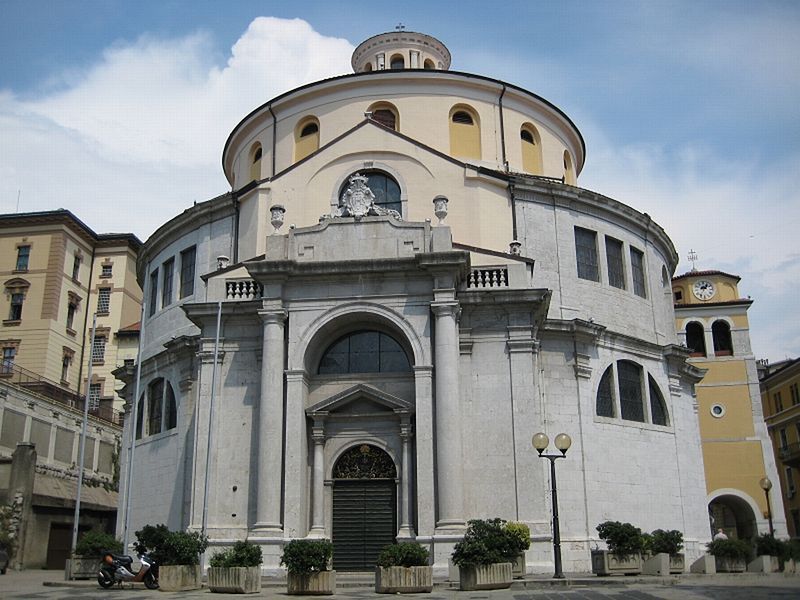
If you walk to the cathedral of St. Vitus in Rijeka, tucked away in the Old Town, you’ll notice a cannonball wedged in the facade, left to the main entrance. A small metal plaque displayed underneath is inscribed with the year 1813 and bears the following statement: The British sent us this fruit whilst chasing the French away. The cannonball is just one of the many that were sent flying over the citizens’ heads on this very occasion, serving as a solemn reminder of what could have happened to Rijeka had it not been for Caroline.

